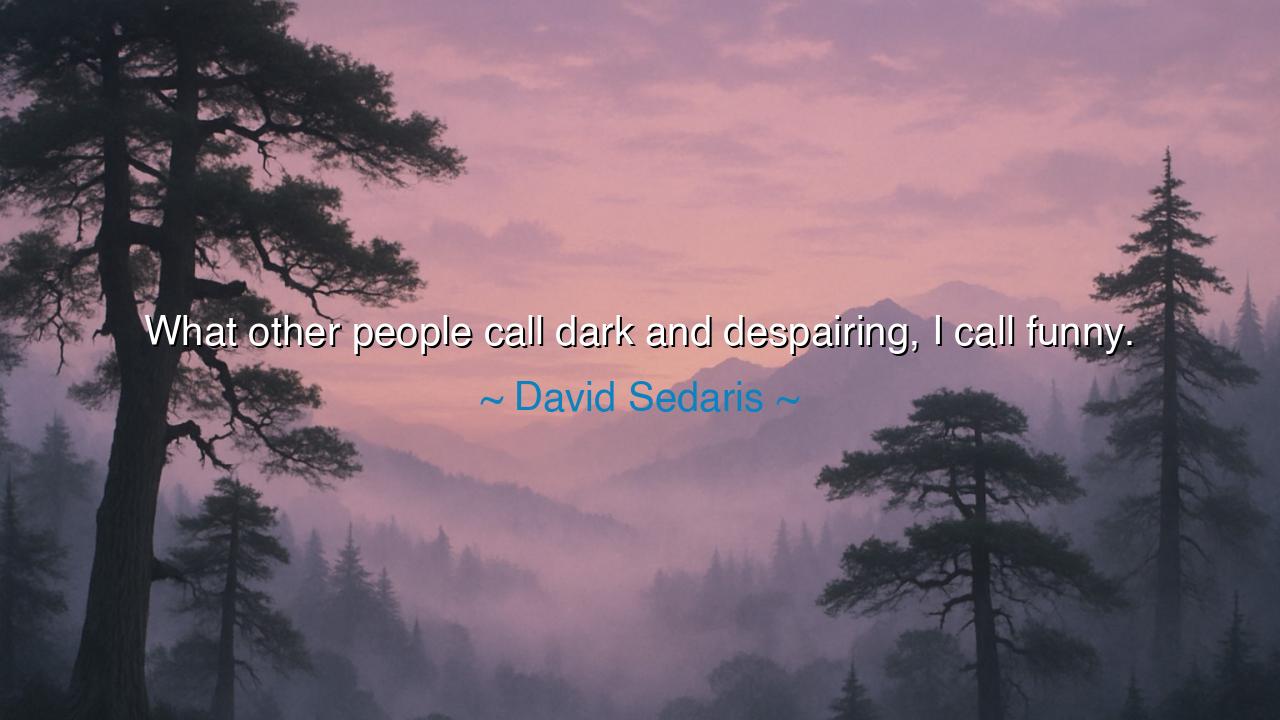
What other people call dark and despairing, I call funny.






The writer David Sedaris, known for his sharp wit and piercing honesty, once said: “What other people call dark and despairing, I call funny.” In these words lies not merely the craft of a humorist, but a philosophy of life — one that transforms suffering into strength, tragedy into laughter, and despair into wisdom. It is the art of seeing light within shadow, the discipline of turning pain into something bearable through humor. Sedaris speaks not as one who denies the existence of darkness, but as one who dares to redefine it, to face its weight and say, “I will laugh anyway.”
To the ancients, this would have been seen as a heroic act of the soul. For in their understanding, laughter was not the enemy of sorrow, but its twin. The Greeks revered Comedy and Tragedy as two faces of the same mask — the mask of life itself. Where one man sees ruin, another sees revelation. Sedaris’s gift is the ability to stand within life’s storms and find the absurdity in them, to transform pain into something that heals through laughter. This is not mockery, but mastery — the ancient art of turning wounds into wisdom.
When Sedaris says that what others call “dark and despairing” he calls “funny,” he reveals the alchemy of resilience. To laugh at darkness is to rob it of its dominion. The one who can laugh amid despair has already won a quiet victory. Consider the philosopher Diogenes of Sinope, who lived in poverty, mocked kings, and slept in a barrel. When asked how he could endure such a life, he replied, “I laugh, because what else is there to do?” In his laughter was freedom. Like Sedaris, he understood that the ability to find humor in suffering is not a denial of pain — it is liberation from it.
The darkness Sedaris speaks of is not only personal; it is universal. Life, by its very nature, carries grief, disappointment, and absurdity. Yet the human spirit has always survived by transforming that weight into story, song, and laughter. The slaves of ancient Rome sang as they labored; the soldiers of every age have joked on the eve of battle. It is through humor that humanity declares, “You cannot break me.” In this sense, Sedaris stands among a long line of truth-tellers — those who face the bleakness of existence and find there not despair, but comedy, a divine irony that redeems the soul.
We see this same spirit in Charlie Chaplin, whose silent films turned the misery of poverty and loneliness into laughter. Behind the tramp’s hat and cane was a wounded man who refused to be consumed by pain. “To truly laugh,” Chaplin once said, “you must be able to take your pain, and play with it.” That is the same wisdom Sedaris offers — that laughter is not ignorance of the dark, but its illumination. To play with sorrow is to tame it. To find humor in despair is to remind the heart that it still beats, that it still belongs to life.
Sedaris’s way of seeing teaches us that perspective is power. Where others see only despair, he sees irony — and in irony, meaning. The difference is not in circumstance, but in vision. This is the ancient practice of the Stoics: to control not what happens, but how one perceives it. The Stoic sage and the comedian are, in truth, kindred spirits. Both stand before the chaos of the world and choose response over reaction, laughter over lament. Sedaris’s humor is thus not mere entertainment — it is philosophy disguised as laughter, a way of living with grace in an absurd world.
So, what lesson can we draw from this? It is this: find the funny in your darkness. When pain comes — as it surely will — look for the spark of absurdity within it. Laugh, not because your suffering is small, but because your spirit is large. The next time life feels unbearable, pause and ask: “What would happen if I laughed?” You will find, as Sedaris has, that laughter loosens the knots of despair and reveals the hidden beauty of being human.
Therefore, O listener, remember: laughter is the oldest medicine, the purest rebellion, and the surest sign that you are still alive. What others may call dark and despairing, you may call funny — not to diminish the pain, but to rise above it. For when you can laugh at the darkness, you are no longer its prisoner; you become its teacher, its poet, its conqueror. And in that laughter, you will find not only humor — but freedom.






AAdministratorAdministrator
Welcome, honored guests. Please leave a comment, we will respond soon